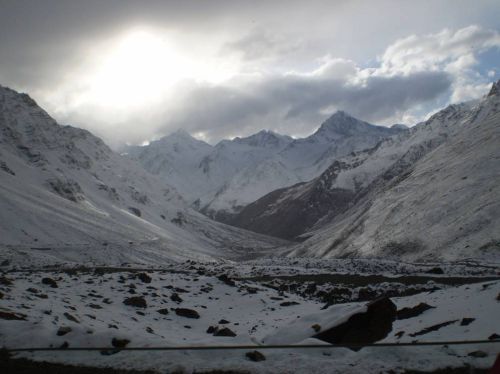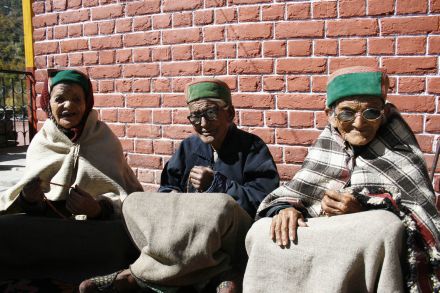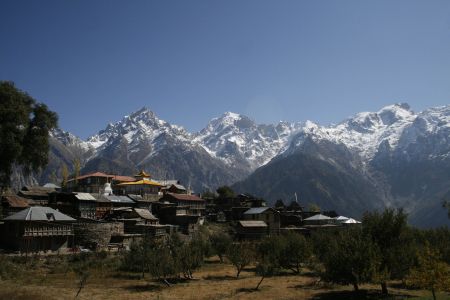Chinni-Kalpa: Roots of a nascent democracy in India were firmly planted high up in the idyllic Himalayan village of Chinni, located in the Greater Himalaya Range near the Indo-Tibet border in Kinnaur district, where some of the privileged first voters from that age still walk to the polling station to exercise their franchise of freedom.
“That vote was a new dawn for us, for till then we were ruled by a feudal system where the Raja’s henchmen often bullied us,” recalls the octogenarian Gian Negi. “Empowerment of the Panchayat Raj system has helped to better our lives,” he adds
For the Election Commission, it must have been a logistic nightmare to initiate the country’s first poll from such a rugged mountainous terrain, when there were was no motorable road connectivity, electricity, schools or health institutions in these parts.
The 91 year Shyam Saran is yet another privileged voter who has been exercising his franchise since 1951. He recalls the first voting took place in autumn, just before the Lavi Fair.
Records show the first poll at Chinni was held on 25th October, 1951.Lavi is a trade fair held on the banks of Satluj River, 125 kms away at Rampur, which till then was the capital of the Bushair Royal State of which Chinni was a part. Most men and women from the village and other parts of Kinnaur used to make an annual horse ride journey for the week long Lavi fair that starts on 11th November. Woolen products, dry fruits, the famous Kinnauri cognac, chilgoza, dried apricots, Tibetan gold and turquoise were bartered for salt, foodgrains, Ghee and other products at the fair.Introduction of apple cultivation has transformed the economy of Kinnaur and today it produces some of the finest quality of apples in the world. However, keeping tradition alive, the Kinnauri people still try and keep a date with Lavi. A 14th November poll, in the midst of the trade fair, for the ensuing assembly election this time around did report a lower turnout of voters when compared to previous ones.
Much like the poll held earlier this month, to beat the winter an October poll was held in 1951 by the Election Commission. Then the vote boxes had to be carried on mule back out of Chinni so that the precious newly exercised voting right could be counted with rest of the country that went to polls later in December 1951 and February 1952.
Gazing into a world thorough senility and spending the twilight of their life at the nunnery attached to Samdip Choling monastery in Chinni, a smile lights up the faces of the over 90 years old Buddhist nuns Sanam Dolma, Norsangh Puti and Yomputi, when overcoming deafness, they understand the question. “It was Nehru that we voted for,” said Dolma.
Not Nehru but Raj Kumari Amrit Kaur was the Indian National Congress candidate for the Mandi-Mahasu parliamentary constituency of which Chinni was a part, in 1951. In fact it was a double seat constituency then, a concept that has been done away with. Kaur along with Gopi Ram, a scheduled caste candidate, of the congress had won the seat.
Ironically the 1962 Indo-Chinese war proved a boon for Kinnaur and other border regions in this part of western Himalayas. The ‘Hind-Chinni bhai bhai’ slogan proved hollow in 1962, a Tibetan refugee influx crossing over the Shipki Pass passed thorough Chinni village, Indian armed forces suffered heavy casualties at the border and a humiliating surrender cast a long shadow on the nation’s foreign policy.
Strategic attention brought Kinnaur and other border regions into national focus. Work on the Indo-Tibet border road along the gorge that River Satluj cuts through the valley was started on a war footing after the war.
“Had the Indo-Chinese war never taken place, we would have remained a forgotten people by Tibet, China or India,” says Prem, a lecturer from Chang Ho village of Kinnaur. “A road to this place would never have been built and the region would have continued to live its primitive lifestyle for decades together,” he adds.
Road connectivity has advanced livelihoods patterns of Kinnaur but fearing that the border dispute would make China lay claim to Chinni village because of similarities in the names, Chinni was renamed as Kalpa in 1962, a name that the village is identified with today.
Photo Credits: (c) Lalit Kumar / Pankaj Goswami / Public Relations Himachal Government
As Editor, Ravinder Makhaik leads the team of media professionals at Hill Post.
In a career spanning over two decades through all formats of journalism in Electronic, Print and Online Media, he brings with him enough experience to steer this platform. He lives in Shimla.






